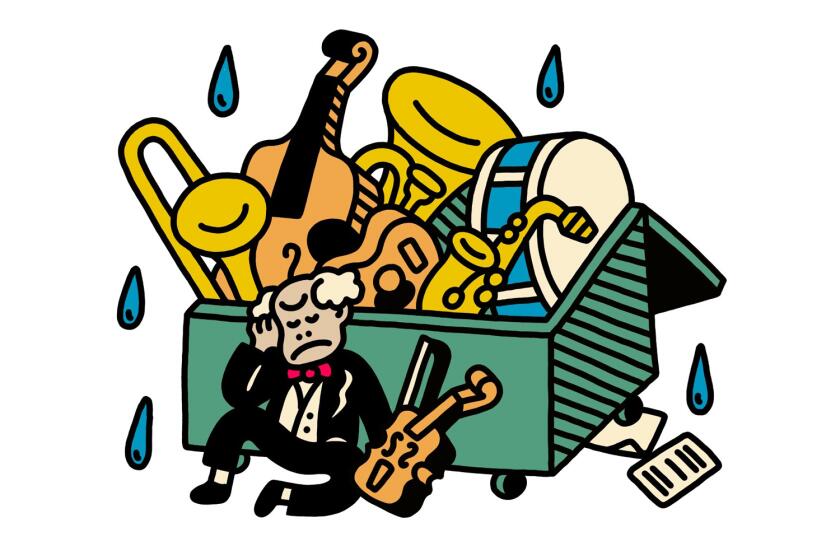Gustavo Dudamel built a ladder. These conductors, many women, are climbing — fast
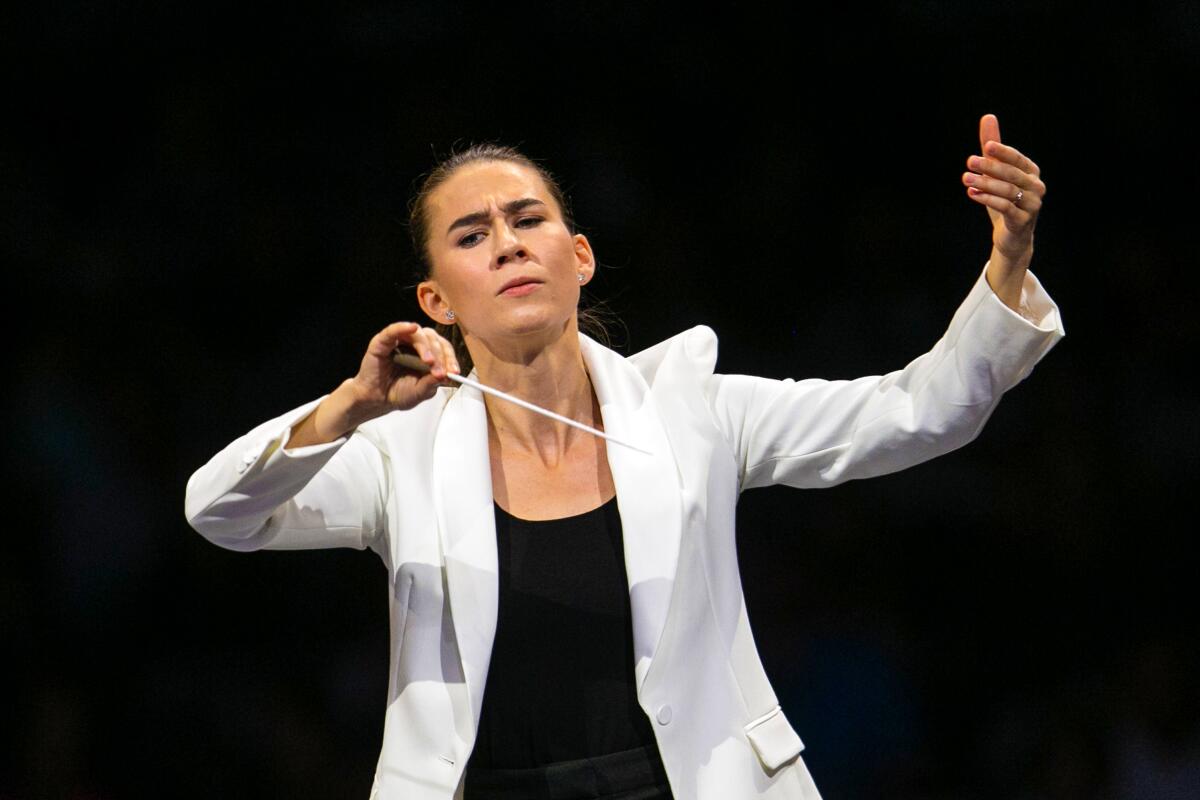
- Share via
Gustavo Dudamel has gotten enough attention of late — an appointment to music director of Paris Opera, sensational Hollywood Bowl concerts, proud papa of the new Frank Gehry-designed Thomas L. Beckmen YOLA Center in Inglewood. So how about we give it up for a baker’s dozen of other conductors?
Tianyi Lu, Enluis Montes Olivar, Ruth Reinhardt, Gemma New and on Thursday night with an exceptional performance of Beethoven’s Seventh Symphony, Marta Gardolinska, made their Bowl debuts this summer. Rafael Payare, San Diego Symphony’s transformative music director, opened the city’s lauded new outdoor Rady Shell. At Stanford University last month, Matthew Aucoin led the premiere of his intriguing new project, “The No One’s Rose,” with a dream cast of Julia Bullock, Davóne Tines and Anthony Roth Costanzo. Mirga Grazinyte-Tyla and Jonothon Heyward blew away the big crowds at the Proms in London this summer, where Ben Gernon also led refined performances.
Everyone is talking about the dashing Finnish conductor Santtu-Matias Rouvali, the new music director of the Philharmonia in London (succeeding Esa-Pekka Salonen). Joshua Weilerstein’s career is taking off, as is that of our own Paolo Bortolameolli, the L.A. Phil’s associate conductor.
They all have one thing in common. They are former Dudamel Fellows. Him, again!
Film composers deserve a better museum showcase for their art than this: a black box room that’s not even playing real movie music.
When Dudamel established his Dudamel Fellowship Program in 2009 as part of his first season as music director, he raised eyebrows. Wasn’t this a little grand for a still unproven 28-year-old conductor to set himself up as a wizened mentor?
In fact, that isn’t quite the way it worked out. Most orchestras have an assistant conductor, or occasionally two, standing by to take over any concert if there is a need. An assistant leads community and children’s concerts. The degree of actual music-director mentoring might vary, but a wealth of experience is gained no matter what.
That’s the Dudamel Fellowship job description as well — partly because the L.A. Phil does more and simply needs more help. But given that Dudamel grew up in the most extensive music education program ever known — Venezuela’s El Sistema has older kids coaching the younger ones — Dudamel began mentoring as a teenager. At 28, he already had more educational experience than most conductors gain in a lifetime.
Coronavirus may have silenced our symphony halls, taking away the essential communal experience of the concert as we know it, but The Times invites you to join us on a different kind of shared journey: a new series on listening.
A striking aspect of the former fellows, however, is how little they are like Dudamel — or each other. Neither their stick technique nor mannerisms give evidence of Dudamel passing on anything. Personality, gender, race, nationality and other aspects of identity appear to suggest far more about their styles. They all seem to be natural leaders, comfortable in their own skin, but any conductor who isn’t capable of at least faking that is doomed to failure.
The main thing these former fellows may take home from L.A. is indoctrination. New music here is part of the daily diet. Dudamel’s curiosity has led to a far more varied repertory at the L.A. Phil than that of any other major orchestra. Here fellows don’t just conduct for children; thanks to YOLA, they conduct children. They must think about what an orchestra plays and why, what is needed to serve diverse audiences and what it means for an orchestra to belong to a community.
And, of course, there is the Bowl with all its thrills and its spills.
Until Dudamel came along, the Bowl had been viewed by L.A. Phil music directors as a necessary evil, an unwieldy venue to be coped with because it draws large crowds who might be won over to classical music and mainly because it finances an ambitious, venturesome institution the rest of the year.
Dudamel’s U.S. debut at the Bowl in 2005 was a uniquely out-of-the-blue lovefest between him, the orchestra and the audience, and he has nurtured that love (this year devoting five weeks to it). Then Grazinyte-Tyla made her Bowl debut as a Dudamel Fellow in 2014, and lightning struck again. “Magical Mirga” is how the Brits have labeled Grazinyte-Tyla, who is the outgoing music director of the City of Birmingham Symphony Orchestra and the woman sure to smash the orchestra glass ceiling to smithereens once and for all.
If you want to hear just how brilliant her conducting has become and how the BBC dotes on her, you can find her Aug. 5 Proms program — which included her captivating premiere of Thomas Adès’ quirky “The Exterminating Angel” Symphony and a mature, radiant performance of Brahms’ Third Symphony — archived in fine sound for a month on the BBC Radio 3 website. While there, don’t miss Heyward, a 2017-18 Dudamel Fellow, conducting the Aug. 7 Proms concert with the National Youth Orchestra of Great Britain bringing mood-elevating vitality to Beethoven’s “Eroica” Symphony.
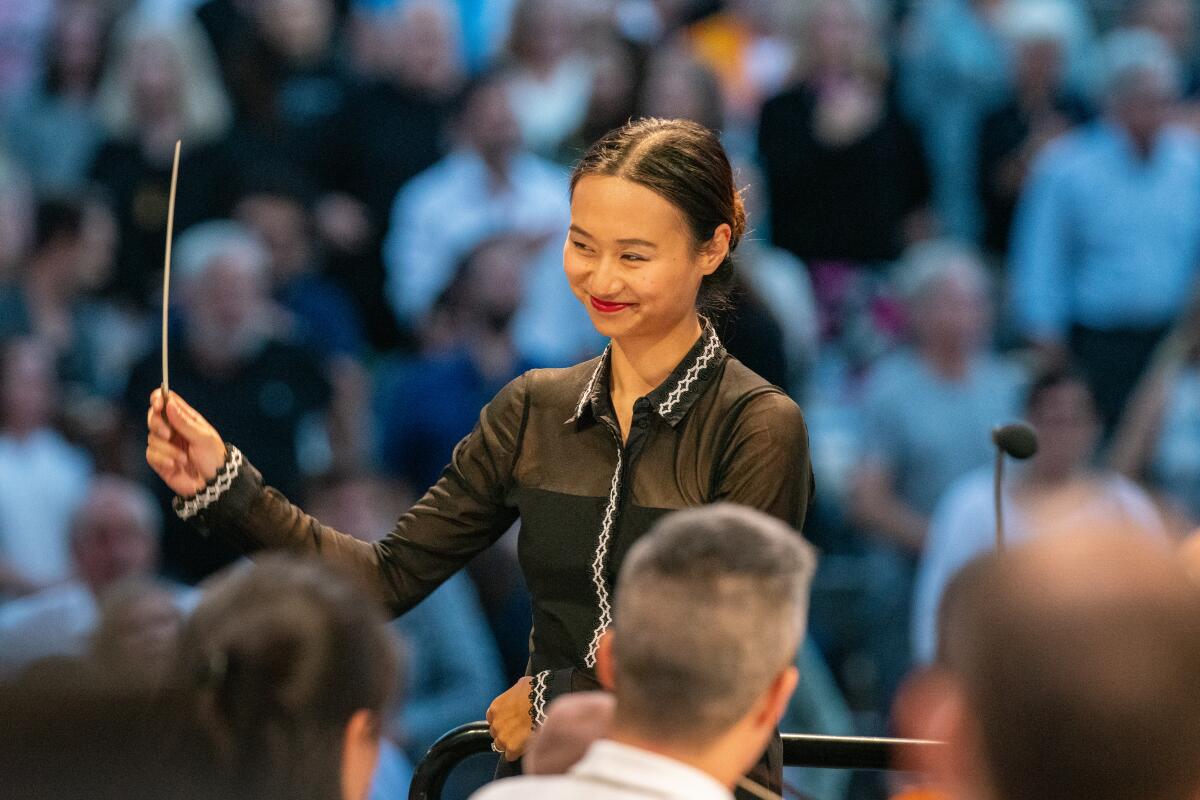
Five former fellows’ Bowl debuts this summer had their inevitable ups and downs. It was fun to hunt for clues in their performances of the National Anthem (none hailed from the U.S.). Lu, who is Chinese, energized “The Star-Spangled Banner” as she did “Pictures at an Exhibition.”
Olivar (who has just been appointed to another season as a fellow) brought the kind of unfettered gusto to the National Anthem as he might to his own Venezuelan one, although that same eagerness nearly knocked Tchaikovsky’s “Little Russian” Symphony off its Russian rails.
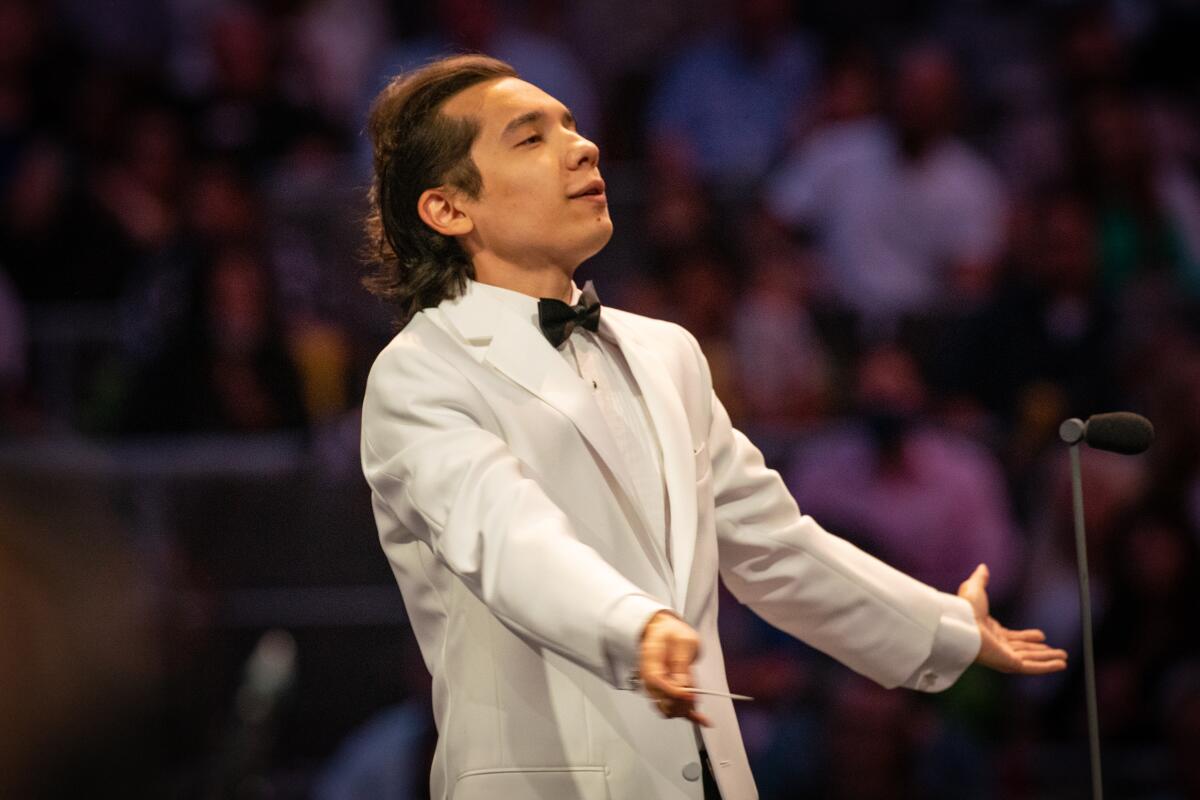
German Reinhardt was respectful of another nation’s anthem, just as she was, in her highly capable manner, to Mendelssohn’s spirited “Italian” Symphony.
New, from New Zealand, proved the most analytical of the bunch, conducting like a human spectrometer, identifying the colors, not only red, white and blue but also subtly mixing misty luminous greys in Schumann’s “Rhenish” Symphony.
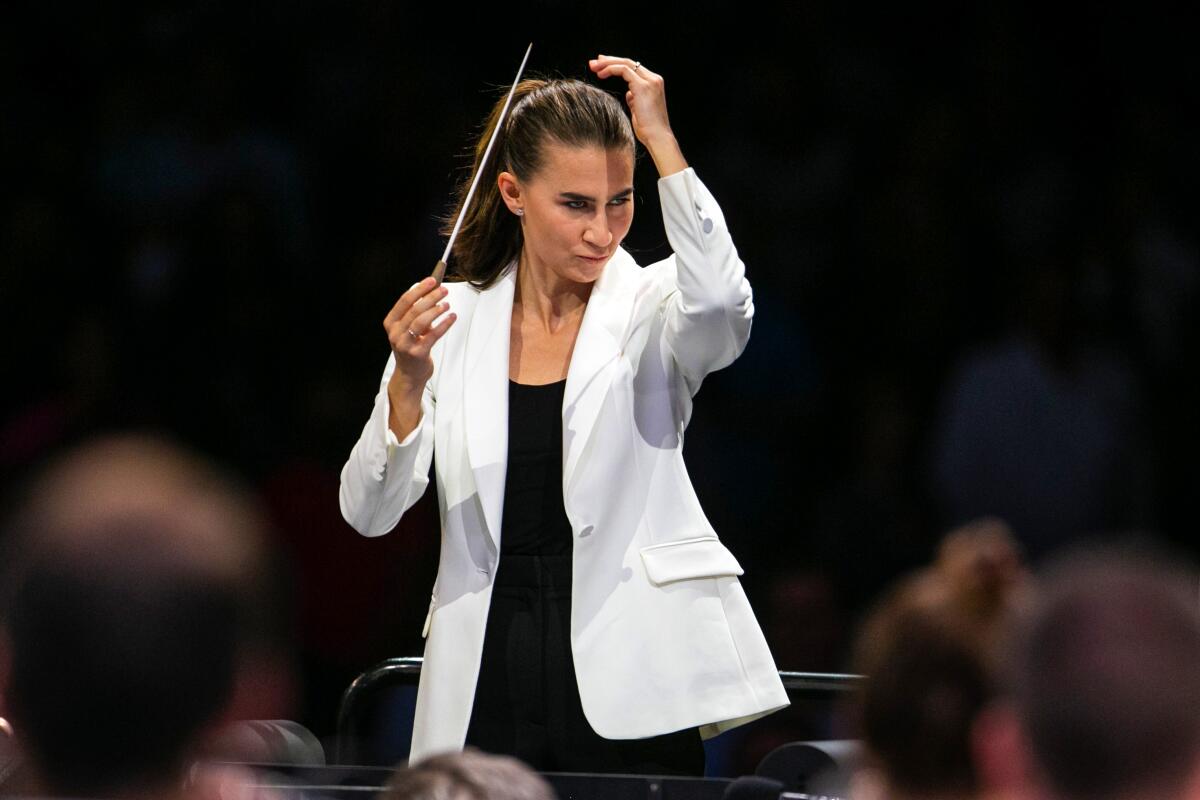
Gardolinska, who is Polish, brought slow, stern, Old-World pomp to the National Anthem. She may have been nervous. Her countrywoman Grazyna Bacewicz’s Overture sounded under-rehearsed, and in Schumann’s Piano Concerto, Gardolinska unobtrusively supported a scintillating Hélène Grimaud. But Beethoven’s Seventh after intermission had arresting power. Gardolinska got the strings to dig in as though they were preparing for a hurricane. They had to; Gardolinska’s rhythmic impetus proved ferocious. Yet through it all, the L.A. Phil gave definition to inner and outer lines while remaining in the thrall of Beethovenian magnificence around every corner.
One thing is sure: Dudamel has given his fellows a conductor’s hammer. The four women who had their Bowl debuts, following the example of Grazinyte-Tyla, are well armored. The glass ceiling doesn’t stand a chance.
In L.A. appearances — Julia Bullock at the Hollywood Bowl, Davone Tines at Monday Evening Concerts — they reveal opera’s future.
More to Read
The biggest entertainment stories
Get our big stories about Hollywood, film, television, music, arts, culture and more right in your inbox as soon as they publish.
You may occasionally receive promotional content from the Los Angeles Times.
